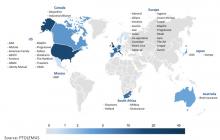US drivers are predominantly open-minded to purchasing usage-based auto insurance (UBI) policies, or pay as you drive insurance, according to a new survey by professional services company Towers Watson. The survey results are a clear indication that UBI is gaining momentum in the marketplace, with more consumers willing to let insurers monitor their driving habits with a telematics device in exchange for potential savings on their car insurance.
Most (79 per cent) respondents to the UBI Consumer Survey
US drivers are predominantly open-minded to purchasing usage-based auto insurance (UBI) policies, or pay as you drive insurance, according to a new survey by professional services company Towers Watson. The survey results are a clear indication that UBI is gaining momentum in the marketplace, with more consumers willing to let insurers monitor their driving habits with a telematics device in exchange for potential savings on their car insurance.
Most (79 per cent) respondents to the UBI Consumer Survey indicated they either would buy a UBI policy or are willing to consider the concept, and if insurers would guarantee drivers’ premiums would not rise, that percentage increased to 89 per cent. Interest in UBI programs was highest among younger drivers (18- to 34-year-olds) with approximately two-thirds (66 per cent) saying they would definitely or probably purchase a UBI policy. Roughly half (54 per cent) of the participants who drive every day showed a strong interest in UBI.
The survey looked beyond pricing benefits associated with UBI products to gauge consumers’ interest in various value-added services that can be enabled by the technology underlying UBI devices. Drivers indicated a telling interest in a number of these services, and 72 per cent of those interested in UBI said they would be willing to pay for them. Drivers showed most interest in vehicle theft tracking, automated emergency response, and vehicle wellness reports.
Notably, 60 per cent of those interested in UBI programs said they would be willing to change their driving behaviour. This was highest among younger drivers, who represent the largest risk segment. When asked how they might change their driving behaviour if a UBI device were to be installed in their car, respondents listed sticking to the speed limit, keeping a safer distance from other vehicles and driving more considerately as the leading adjustments.
Most (79 per cent) respondents to the UBI Consumer Survey indicated they either would buy a UBI policy or are willing to consider the concept, and if insurers would guarantee drivers’ premiums would not rise, that percentage increased to 89 per cent. Interest in UBI programs was highest among younger drivers (18- to 34-year-olds) with approximately two-thirds (66 per cent) saying they would definitely or probably purchase a UBI policy. Roughly half (54 per cent) of the participants who drive every day showed a strong interest in UBI.
The survey looked beyond pricing benefits associated with UBI products to gauge consumers’ interest in various value-added services that can be enabled by the technology underlying UBI devices. Drivers indicated a telling interest in a number of these services, and 72 per cent of those interested in UBI said they would be willing to pay for them. Drivers showed most interest in vehicle theft tracking, automated emergency response, and vehicle wellness reports.
Notably, 60 per cent of those interested in UBI programs said they would be willing to change their driving behaviour. This was highest among younger drivers, who represent the largest risk segment. When asked how they might change their driving behaviour if a UBI device were to be installed in their car, respondents listed sticking to the speed limit, keeping a safer distance from other vehicles and driving more considerately as the leading adjustments.








